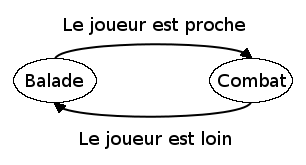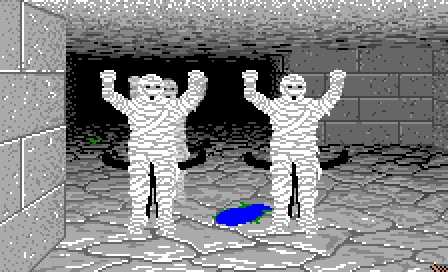Téléchargements
Exécutable de l'éditeur de niveaux - exactement le même que la partie 40 (Windows 32bits)
Exécutable du jeu (Windows 32bits)
Avant d'essayer de compiler le code, allez dans l'onglet "Projets" dans le menu de gauche, séléctionnez l'onglet "Run" pour votre kit,
et mettez dans "Working directory" le chemin de "editor\data" pour l'éditeur ou "game\data" pour le jeu.
Comportements de groupe
comportements. Il peut soit:
- Se balader aux alentours aléatoirement s'il ne vous voit pas.
- Poursuivre votre équipe pour se rapprocher d'elle.
- Vous combattre quand il est sur une case voisine.
- Vous fuir quand les monstres ont pris trop de dégâts.
mais on ne parlera pas de ça pour le moment.
Pour implémenter ce type d'I.A. dans un jeu on utilise généralement une "machine à états finis".
Mais n'ayez pas peur, ce n'est pas aussi compliqué que ça en a l'air.
Dans une machine à états finis, un système peut avoir plusieurs états. Ici, notre groupe de monstres peut être dans
4 états (Balade, Poursuite, Combat ou Fuite).
Et sous des conditions spécifiques, on peut faire une transition d'un état à l'autre.
Dans cette partie on va seulement utiliser 2 états: Balade et Combat.
- Dans l'état balade on ne fera rien. Le groupe ne bougera même pas, on verra ça dans une autre partie.
- Dans le mode combat, les monstres à l'intérieur du groupe vont lancer une animation d'attaque à des moments
aléatoires.
Maintenant pour les transitions:
- Quand on est en balade, si le joueur est dans une des 4 cases voisines, on passera en mode combat.
- Quand on est dans l'état combat, si le joueur est plus loin que les cases voisines, on revient en balade.
Voici une image qui devrait être plus claire:

Implémentation des états
CMonsters.
Maintenant, comme ils vont devenir plus complexes et avoir leurs propres méthodes, c'est plus simple de les définir
comme des classes séparées.
//---------------------------------------------------------------------------------------------
class CMonster
{
public:
[...]
EMonsterPos pos;
EMonsterDir dir;
int life;
[...]
};
//---------------------------------------------------------------------------------------------
class CMonsterGroup2
{
public:
[...]
CMonster monsters[4];
EMonsterDir dir;
[...]
};
déclarée dans "map.h".
Maintenant, comme on l'a dit, chaque groupe de monstres est dans un état donné (soit balade, soit combat).
Alors on va leur ajouter une variable "state":
enum EMonsterState
{
eMonsterState_Wandering,
eMonsterState_Fight
};
class CMonsterGroup2
{
public:
[...]
EMonsterState state;
};
chaque frame.
Cette fonction va appeler soit une fonction wander() soit une fonction fight() en fonction de l'état courant
du groupe.
void CMonsterGroup2::update(CVec2 mapPos, uint8_t type)
{
[...]
// gère le comportement du groupe pour chaque état
switch (state)
{
case eMonsterState_Wandering:
wander(mapPos, type);
break;
case eMonsterState_Fight:
fight(mapPos, type);
break;
}
}
la position du joueur.
//---------------------------------------------------------------------------------------------
void CMonsterGroup2::wander(CVec2 mapPos, uint8_t type)
{
// transition en état de combat ?
CVec2 dist = player.pos - mapPos;
bool isNearPlayer = (dist.x == 0 && ABS(dist.y) == 1) || (dist.y == 0 && ABS(dist.x) == 1);
if (isNearPlayer == true)
{
state = eMonsterState_Fight;
[...]
}
}
//---------------------------------------------------------------------------------------------
void CMonsterGroup2::fight(CVec2 mapPos, uint8_t type)
{
// transition en mode ballade ?
CVec2 dist = player.pos - mapPos;
bool isNearPlayer = (dist.x == 0 && ABS(dist.y) == 1) || (dist.y == 0 && ABS(dist.x) == 1);
if (isNearPlayer == false)
{
state = eMonsterState_Wandering;
}
}
groupe.
void CMonsterGroup2::update(CVec2 mapPos, uint8_t type)
{
// met à jour tous les monstres du groupe
for (int i = 0; i < 4; ++i)
if (monsters[i].pos != eMonsterPosNone)
monsters[i].update(*this, mapPos, type);
[...]
}
Comportements des monstres
Alors la fonction update() de chaque monstre va elle aussi appeler soit une fonction wander(), soit une fonction
fight().
void CMonster::update(CMonsterGroup2& group, CVec2 mapPos, uint8_t type)
{
displayAttackTimer.update();
switch (group.state)
{
case eMonsterState_Wandering:
wander();
break;
case eMonsterState_Fight:
fight(mapPos, type);
break;
}
}
Mais dans l'état combat On veut lancer l'animation d'attaque du monstre aléatoirement.
Alors regardons les valeurs dont nous aurons besoin.
Paramètres d'attaque
<monsters>
[...]
<!-- 01 Scorpion Géant -->
<monster name = "MONSTER01">
[...]
<time_between_atk>200</time_between_atk>
<atk_display_time>40</atk_display_time>
<atk_sound>Attack_Scorpion.wav</atk_sound>
[...]
</monster>
- time_between_atk est la durée minimum entre 2 attaques. On va y ajouter une valeur aléatoire.
- atk_display_time est la durée de l'animation d'attaque. Dans ce jeu les animations consistent en une
seule image qui sera affichée durant ce temps.
- atk_sound est le nom du son qui sera joué. Notez que certains monstres n'ont pas de son.
Pour gérer ces temps on va ajouter des timers à notre monstre:
class CMonster
{
public:
[...]
CTimer displayAttackTimer;
CTimer nextAttackTimer;
};
void CMonster::initNextAttack(uint8_t type)
{
int minTime = monsters.monstersDatas[type].timeBetweenAttack;
int nextTime = minTime + (rand() % 40) - 10;
if (minTime > 150)
nextTime += (rand() % 80) - 20;
nextAttackTimer.set(nextTime, true);
}
Et en même temps on va tourner le monstre vers le joueur:
void CMonsterGroup2::wander(CVec2 mapPos, uint8_t type)
{
// transition en état de combat ?
[...]
if (isNearPlayer == true)
{
state = eMonsterState_Fight;
// direction vers le joueur
EMonsterDir dir;
if (dist.x > 0)
dir = eMonsterDirRight;
else if (dist.x < 0)
dir = eMonsterDirLeft;
else if (dist.y > 0)
dir = eMonsterDirDown;
else
dir = eMonsterDirUp;
// initialise chaque monstre du groupe
for (int i = 0; i < 4; ++i)
if (monsters[i].pos != eMonsterPosNone)
{
monsters[i].dir = dir;
monsters[i].initNextAttack(type);
}
}
}
Quand il se termine, on joue le son d'attaque, on lance le timer d'affichage et on relance le timer "entre
attaques".
void CMonster::fight(CVec2 mapPos, uint8_t type)
{
if (nextAttackTimer.update() == true)
{
QString soundName = monsters.monstersDatas[type].attackSound;
if (soundName.isEmpty() == false)
sound->play(mapPos, soundName.toLocal8Bit().constData());
int attackTime = monsters.monstersDatas[type].attackDisplayTime;
displayAttackTimer.set(attackTime, true);
initNextAttack(type);
}
}
Afficher l'attaque

On a vu les sprites d'attaque dans la partie précédente.
Notez qu'ils remplacent seulement une image "de face" (on n'a pas de sprite d'attaque pour les cotés ou le dos).
Donc quand on récupère le sprite du monstre dans CMonsters::draw() on doit seulement tester si le timer d'affichage
tourne dans le cas d'un monstre de face:
// sprite
[...]
if (tableDir == eMonsterDirDown)
{
// de face
if (monster.displayAttackTimer.isRunning())
{
// attaque
spriteName = monstersDatas[type].attackImage;
if (spriteName.isEmpty() == true)
spriteName = monstersDatas[type].frontImage;
}
else
{
// normal
spriteName = monstersDatas[type].frontImage;
}
}
[...]